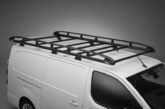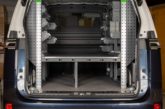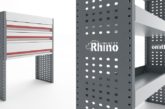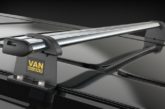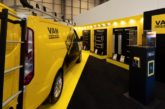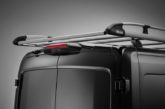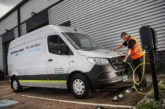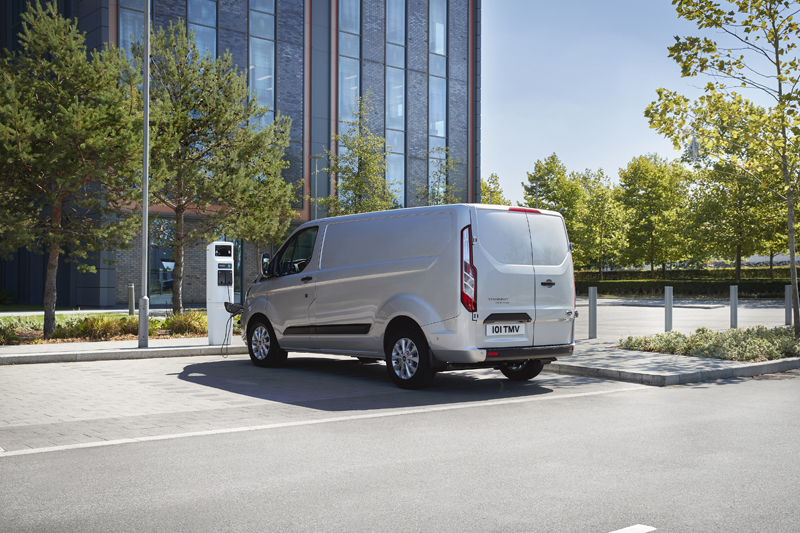
Ford appears to be heading towards an electric avenue in its vision for the future of commercial vehicles. Lee Jones reports from the manufacturer’s ‘Go Further’ event in Amsterdam on the forthcoming additions to the Transit range.
The automotive sector is now experiencing some of the most significant challenges in its history, and commercial vehicles are far from exempt. Ever since Henry Ford opened the road for the common man with the launch of the Model T, the mechanisms behind vehicle power have seen little fundamental change, and, given that we have never been more mobile, it is technology that has served us well. The problem, of course, is how to balance our drive to move forward with the need to address issues of air pollution and global warming, and the way to do it is with alternative powertrains, and the smarter, more efficient use of our transport.
Of course, for a plumber or installer, the van is just another tool, and its size needs to be in synergy with the demands of their business, but those considerations now increasingly extend to what’s under the bonnet. For city drivers the potential additional costs of congestion charging and low emissions zones make clean diesel, hybrid or even electric solutions either imperative or highly advantageous to a company’s bottom line, whilst productivity in our increasingly crowded little island is critical.
What an industry as diverse as the plumbing and heating sector needs from vehicle manufacturers like Ford is a mix of solutions and in terms of propulsion choices, that’s just what is presented to its customers. The Eco Boost petrol engines available on the Transit Courier, Connect and Fiesta van are tailored for lighter urban use, and clean Euro VI Diesel will continue to power the bulk of the trades, with the latest two tonne Transit models providing up to a 7% increase in fuel efficiency.
Going hybrid
These established answers will shortly be joined by a first in the segment, with EcoBlue hybrid technology in the Transit and Transit Custom offering significant efficiency improvements. Plug in Hybrid Electric Vehicles (PHEV) represent a lower cost entry point to a purely electrified vehicle, with the ability to travel in and out of ULEZ urban areas on zero emissions battery power without the range anxiety often associated with a purely electric unit.
Ford will, in fact, be the first volume van manufacturer to offer a hybrid in a one tonne unit, a vehicle that can travel on just electric power for up to 50km, with the one litre EcoBoost petrol engine extending that distance to 500km. There’s no compromise on payload either, and, through a series of London-based pilot schemes, featuring up to 20 prototypes at any one time, the vehicle has already found favour with end users. On the final production models drivers will benefit from four selectable modes, which means either electric or conventional power can be selected, for instance, maximising the efficiency of the combination of an internal combustion engine and battery.
Lithium-ion technology is advancing, its costs are decreasing whilst ranges are extending, and the ultimate aim is an all-electric Transit, which should connect with its customers at some point in 2021. In the meantime, the Transit PHEV will already be on the charge in the mission to provide lower emissions and fuel consumption, but other technologies can also make telling contributions to a reduced cost of ownership.
Making connections
We are living in an increasingly inter-connected world and Ford is plugging into it with the introduction of on-board modems on all of its commercial vehicles from the end of this year, a feature already available on the Transit Connect. If you think that telematics systems are just for fleets then think again, because the functionality of the Ford Pass app will deliver benefits right to an installer’s smartphone. Of course, the beauty of an app is that it can be continually updated and a whole host of new features have been added. Parking locations can be filtered according to the height of the van, and a locator will find the nearest Transit Centre, whilst security concerns have also been addressed.
Given that a plumber’s van is parked up outside the job for much of the day it makes it vulnerable to the opportunistic thief, but Ford Pass is here again your friend, letting you know if your wheels are receiving unwanted attention and if the alarm has been activated. This existing app will shortly be joined by Ford Pass Pro, specifically designed for the owners of between one to five vehicles, with their location and health illustrated on a single screen, whilst alerts can be set up for servicing.
In 2018 alone the Detroit motor giant sold over 380,000 commercial vehicles in Europe, with the Transit ranking as the sixth most popular vehicle of any kind across the continent. What has driven the market for many years is the provision of a dizzying array of options, lengths and heights to suit every conceivable business, and, thanks to the makers of the Transit, it will now extend these to the method of propulsion.
Qualified Vehicle Modifier (QVM) Partners
The Transit already has hundreds of individual variants but plumbers can also access more specialist models through its expanding network of convertors. The Qualified Vehicle Modifier (QVM) Partners have unique access to vehicle information and Ford collaborates with them to ensure that the end user is delivered the solution they need. The number of QVMs is also set to double by 2020, and helping customers to choose exactly what they want is a crucial role for the network of Transit Centres.





